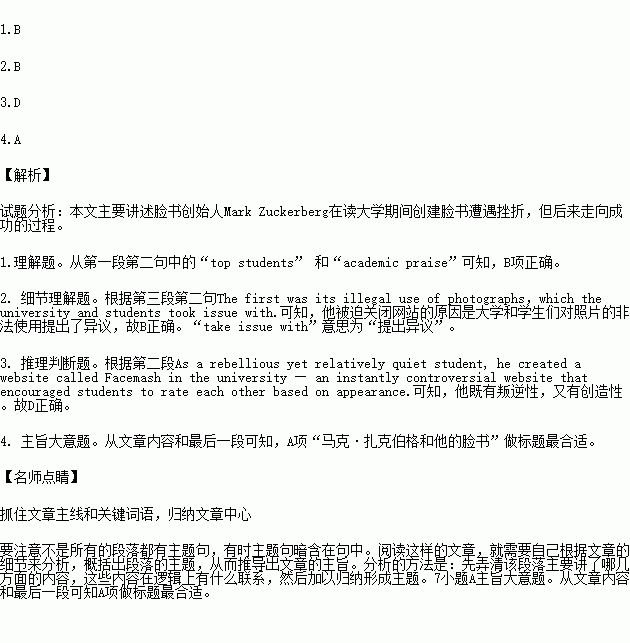题目内容
Born in the State of New York on May 14th, 1984, Mark Zuckerberg was an instant success. In his high school years, he was considered one of top students in the classics, before moving into the arts, sciences, and literature, again picking up high marks and receiving academic praise. It earned him admission to Harvard University.
As a rebellious yet relatively quiet student, he created a website called Facemash in the university — an instantly controversial website that encouraged students to rate each other based on appearance.
The site was controversial for several reasons. The first was its illegal use of photographs, which the university and students took issue with. The second was its controversial nature — not every student like being ranked based on their appearance. The third was its huge resource use — while it was hosted on Harvard servers, it was the most popular page in the university’s entire network.
Zuckerberg was soon forced to shut the site down, but its popularity and controversy had made him consider its future potential. He soon turned the simple site into a personal one for Harvard students, encouraging them to network with their peers at the college. It was then, together with his two friends, that they launched “The Facebook”, which immediately spread to other colleges and grew into a public service that anyone could access in the United States, whether to network with friends and family, or to play games.
The company has been criticized frequently, nevertheless, Zuckerberg has remained true to his initial vision — to create a website that the entire world can use to communicate openly and easily with one another and to keep the user experience clean and pure. The end result is one of the world’s biggest online businesses.
Although its true value is debatable, it’s safe to say that Facebook, and its creator Mark Zuckerberg, are two of the twenty-first century’s most influential, controversial, and potentially powerful figures.
1.When Mark Zuckerberg was a student, he ________.
A. was often praised by teachers for the website he created
B. had good academic performance
C. alone created a website called Facebook
D. encouraged students to set up business like him
2.The reason why Zuckerberg shut the site down was probably that ________.
A. his website was not popular
B. he was doubted for the way he used photographs
C. he needed time to reconsider his choice
D. he stole resource on Harvard server
3.Which words can best describe Zuckerberg?
A. easy-going and smart.B. quiet and shy.
C. talented and outgoing.D. rebellious and creative.
4.The best title of the passage should be ________.
A. Mark Zuckerberg and his Facebook
B. The Foundation of Facebook
C. A Talent from Harvard University
D. The Development of Facebook
 学期复习一本通学习总动员期末加暑假延边人民出版社系列答案
学期复习一本通学习总动员期末加暑假延边人民出版社系列答案 芒果教辅暑假天地重庆出版社系列答案
芒果教辅暑假天地重庆出版社系列答案
